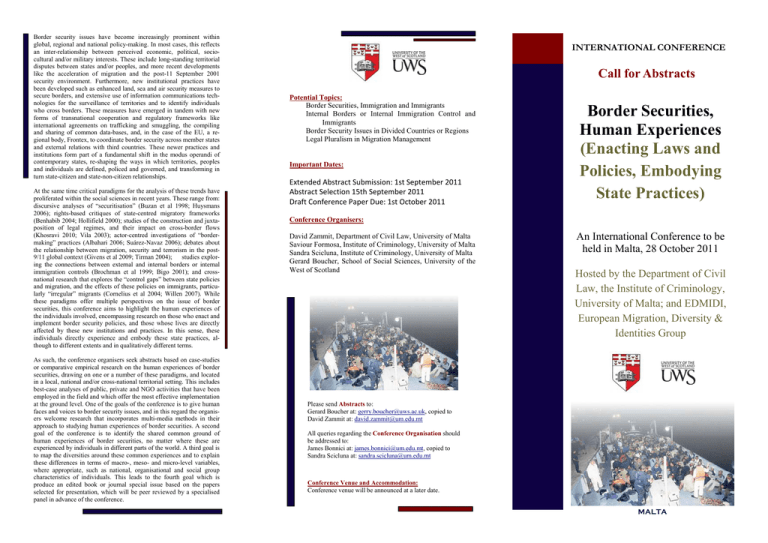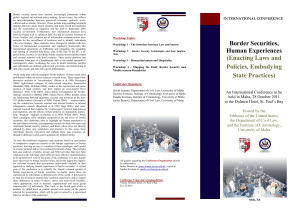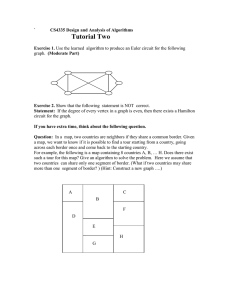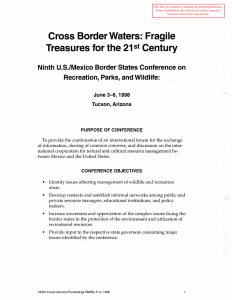INTERNATIONAL CONFERENCE
advertisement

Border security issues have become increasingly prominent within global, regional and national policy-making. In most cases, this reflects an inter-relationship between perceived economic, political, sociocultural and/or military interests. These include long-standing territorial disputes between states and/or peoples, and more recent developments like the acceleration of migration and the post-11 September 2001 security environment. Furthermore, new institutional practices have been developed such as enhanced land, sea and air security measures to secure borders, and extensive use of information communications technologies for the surveillance of territories and to identify individuals who cross borders. These measures have emerged in tandem with new forms of transnational cooperation and regulatory frameworks like international agreements on trafficking and smuggling, the compiling and sharing of common data-bases, and, in the case of the EU, a regional body, Frontex, to coordinate border security across member states and external relations with third countries. These newer practices and institutions form part of a fundamental shift in the modus operandi of contemporary states, re-shaping the ways in which territories, peoples and individuals are defined, policed and governed, and transforming in turn state-citizen and state-non-citizen relationships. At the same time critical paradigms for the analysis of these trends have proliferated within the social sciences in recent years. These range from: discursive analyses of “securitisation” (Buzan et al 1998; Huysmans 2006); rights-based critiques of state-centred migratory frameworks (Benhabib 2004; Hollifield 2000); studies of the construction and juxtaposition of legal regimes, and their impact on cross-border flows (Khosravi 2010; Vila 2003); actor-centred investigations of “bordermaking” practices (Albahari 2006; Suárez-Navaz 2006); debates about the relationship between migration, security and terrorism in the post9/11 global context (Givens et al 2009; Tirman 2004); studies exploring the connections between external and internal borders or internal immigration controls (Brochman et al 1999; Bigo 2001); and crossnational research that explores the “control gaps” between state policies and migration, and the effects of these policies on immigrants, particularly “irregular” migrants (Cornelius et al 2004; Willen 2007). While these paradigms offer multiple perspectives on the issue of border securities, this conference aims to highlight the human experiences of the individuals involved, encompassing research on those who enact and implement border security policies, and those whose lives are directly affected by these new institutions and practices. In this sense, these individuals directly experience and embody these state practices, although to different extents and in qualitatively different terms. As such, the conference organisers seek abstracts based on case-studies or comparative empirical research on the human experiences of border securities, drawing on one or a number of these paradigms, and located in a local, national and/or cross-national territorial setting. This includes best-case analyses of public, private and NGO activities that have been employed in the field and which offer the most effective implementation at the ground level. One of the goals of the conference is to give human faces and voices to border security issues, and in this regard the organisers welcome research that incorporates multi-media methods in their approach to studying human experiences of border securities. A second goal of the conference is to identify the shared common ground of human experiences of border securities, no matter where these are experienced by individuals in different parts of the world. A third goal is to map the diversities around these common experiences and to explain these differences in terms of macro-, meso- and micro-level variables, where appropriate, such as national, organisational and social group characteristics of individuals. This leads to the fourth goal which is produce an edited book or journal special issue based on the papers selected for presentation, which will be peer reviewed by a specialised panel in advance of the conference. INTERNATIONAL CONFERENCE Call for Abstracts Potential Topics: Border Securities, Immigration and Immigrants Internal Borders or Internal Immigration Control and Immigrants Border Security Issues in Divided Countries or Regions Legal Pluralism in Migration Management Important Dates: Extended Abstract Submission: 1st September 2011 Abstract Selection 15th September 2011 Draft Conference Paper Due: 1st October 2011 Border Securities, Human Experiences (Enacting Laws and Policies, Embodying State Practices) Conference Organisers: David Zammit, Department of Civil Law, University of Malta Saviour Formosa, Institute of Criminology, University of Malta Sandra Scicluna, Institute of Criminology, University of Malta Gerard Boucher, School of Social Sciences, University of the West of Scotland An International Conference to be held in Malta, 28 October 2011 Hosted by the Department of Civil Law, the Institute of Criminology, University of Malta; and EDMIDI, European Migration, Diversity & Identities Group Please send Abstracts to: Gerard Boucher at: gerry.boucher@uws.ac.uk, copied to David Zammit at: david.zammit@um.edu.mt All queries regarding the Conference Organisation should be addressed to: James Bonnici at: james.bonnici@um.edu.mt, copied to Sandra Scicluna at: sandra.scicluna@um.edu.mt Conference Venue and Accommodation: Conference venue will be announced at a later date. MALTA


